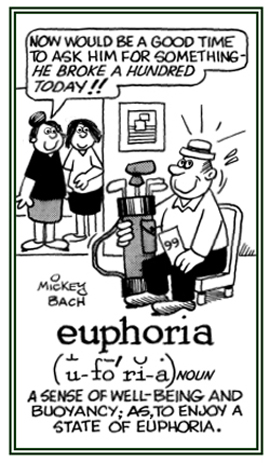eu-
(Greek: good, well, normal; happy, pleasing; used as a prefix)
euphoretic
1. A physician's term for the quality of feeling healthy and comfortable; especially, when sick: The relief and euphoria that Sandra felt following her successful operation was noticed by her parents when they came to visit her.
3. Etymology: from Greek, from euphoros; literally, "bearing well," from eu-, "well" + pherein, "to carry".

© ALL rights are reserved.
Go to this Word A Day Revisited Index
Euphoria can be detected in patients who have an affliction of hyperactivity or also of abnormal conditions of mood connected with other physical disorders.
2. A state of great happiness or well-being: Sam's grandmother was in a state of euphoria when her grandchildren finally came to visit her from Germany.3. Etymology: from Greek, from euphoros; literally, "bearing well," from eu-, "well" + pherein, "to carry".

Go to this Word A Day Revisited Index
so you can see more of Mickey Bach's cartoons.
euphoric
Ecstatic: extremely happy or excited.
euphoristic
euphoropsis
The condition whereby people see normally, free of any symptoms or complaints.
Easy, free, relaxed respiration: Following Ruth's yearly physical check-up at her doctor's office, she talked to Dr. Thompson who said she was completely healthy, including her eupnea, which was very good.
Eupnea is the type of breathing observed in a normal individual under resting conditions.
eupneic
eupnoea
eupotamic
Pertaining to an aquatic organism thriving in both flowing and standing fresh water.
A normal ability to perform coordinated movements: "The doctor told his patient that his muscular performances were normal and very good; especially, for someone of his age of 90."
eupyrexia
Normal fever.
eurhythmia
Harmonious relationships in the body or separate organ development.
eurhythmics, eurythmics
1. The art of interpreting musical compositions by rhythmical, free-style bodily movement.
2. The art of interpreting in bodily movements the rhythm of musical compositions.
2. The art of interpreting in bodily movements the rhythm of musical compositions.
Applied to a method invented by Emile Jaques-Dalcroze, a Swiss composer, with the purpose of developing the sense of rhythm and symmetry.
eustatic
eusthenia


